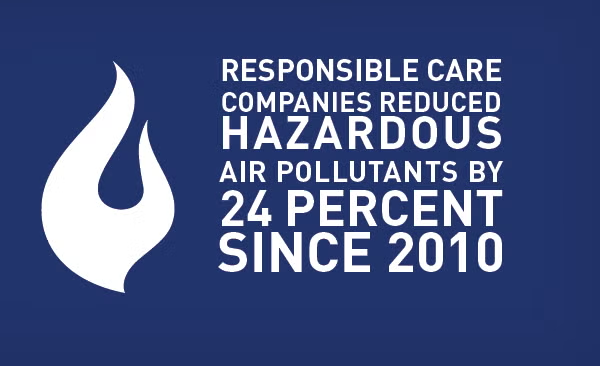Recently ProPublica released a report, “Poison in the Air” that, without more information and context, could cause readers to be fearful when they shouldn’t be.
First and foremost, we understand that people want to know that the environment and the communities where they live are safe and clean, and that includes the air they breathe. We agree. American Chemistry Council (ACC) member companies strive to be responsible partners when it comes to helping protect air quality and preserving this valuable shared resource. We support efforts to enhance the availability and accuracy of air quality data.
Industry Performance

ACC member companies, under Responsible Care®, follow a “Plan-Do-Check-Act” management system and track and report their performance against specific environmental, health, safety and security metrics and ACC makes this information publicly available.
Since the 1980s, total toxic releases and air emissions of criteria pollutants have fallen sharply in the United States, even as population and GDP have grown. Emissions of EPA Toxic Release Inventory (TRI) chemicals to air are declining and are the primary driver of lower total releases. Releases to air were down 57% from 2007 to 2019 and 3.7% from 2018 to 2019, according to EPA. Over the past decade, ACC member companies have reduced emissions of hazardous air pollutants by more than 24%.
Environmental Justice
Environmental justice and working to address concerns of fence line communities are critical issues today. The renewed focus on ways the public and private sectors can work together to help preserve and protect the environment including our climate, air, water, and land -- is a positive development, and we welcome it. Public policy discussions should be more inclusive so that traditionally underrepresented communities have a voice and their concerns are factored into decision making. Our industry is committed to being a constructive partner as ideas and opportunities to address environmental justice issues continue to develop.
EPA’s RSEI
ProPublica indicates that its methodology relies on its own “advanced data processing software” and the U.S. Environmental Protection Agency (EPA)’s Risk-Screening Environmental Indicators (RSEI) model.
Context is key here. In the section of its dashboard “How to Use RSEI Results,” EPA is clear that “RSEI does not provide a risk assessment, so it is inappropriate to use it to:
- Conclude that a particular chemical release is causing harm to a specific population or location,
- Draw conclusions or make decisions about the risk posed by any particular facility, or
- Draw conclusions about individual risk or generate quantitative risk estimates.”
ProPublica itself says that its map “works as a screening tool, not as a site-specific risk assessment. It cannot be used to tie individual cancer cases to emissions from specific industrial facilities…”
Industry Commitment
American chemistry works to advance sustainability worldwide, through innovation, collaboration and technologies that enhance the safety and reduce environmental impacts of our products and our operations. Clean air and a healthy environment are important to us. Protecting air quality is a vital part of enhancing public and environmental health, and ACC and its members support efforts to help reduce emissions and keep our air clean.